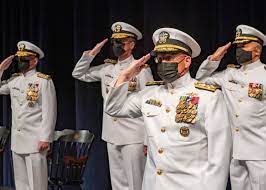Serving in the military definitely stretches one’s comfort zone and is an opportunity to achieve personal and professional growth. Whether sacrificing comfort, undergoing physical challenges, or leaving loved ones at home, the military proves itself to be a challenging yet rewarding act of service. History is replete with examples of humble, everyday citizens who were forged into transformative leaders by the crucible of combat, service, and sacrifice. While many individuals with impeccable military careers went on to become household names, there are legions of veterans who hang up the uniform and carry those qualities with understated fanfare into their workplaces and communities each and every day. These attributes enrich our citizenry and are quickly recognized by employers who eagerly recruit veterans to bring military values to the workplace.
Integrity
Each branch of the military service carries a code of conduct that all members are expected to adhere to. In the Navy, three simple words define the guiding principles of all who wear the uniform: “Honor, Courage, Commitment”. The military has its own judicial system, the Uniformed Code of Military Justice, where a member can be found guilty of simply “conduct unbecoming” when their actions stray from the organizational values. This philosophy is rooted in centuries of tradition and experience that affirm how Integrity provides a qualitative edge on the battlefield. One of the everyday tasks of military members is to keep classified material secure, not disclose national secrets that could put fellow service members’ lives in danger and national security at risk. These principles become second nature to military members, even in an era when sharing information on social media and through other channels has never been easier. It takes discipline to resist the urge to seek the “likes” that would inevitably come from spilling the tea, but staying mission-focused is how we keep America secure. As the virtue of integrity is cultivated and reinforced within the military, it becomes a great skill to carry into civilian life. Industry prizes candidates who exemplify integrity, from the front-line worker doing cash transactions to the behind-the-scenes employee who holds proprietary information in the knowledge economy, companies can’t rely on their employees’ honesty.
Flexibility
Charles Darwin is often quoted as, “It is not the strongest of the species that survives, nor the most intelligent. It is the one most adaptable to change.” If the pandemic has taught us anything, it’s the importance of flexibility. Every aspect of our personal and professional lives has been upended over the past two years, and those who have been able to weather it successfully – or even thrive, have been those who can roll with the punches. When I was deployed with the Marines, the plans would change so frequently that it became the rule, not the exception. To help take it in stride we’d utter the expression, “Semper Gumby!” Everyone smiles with the notion that like the lovable cartoon character, we’d get through it and find a way to exemplify the unofficial Marine credo that had brought the Corps so much success during so many seemingly impossible missions: “Improvise, Adapt, and Overcome.” Flexibility fosters resilience, one of the most valuable qualities in an increasingly uncertain world.
Communication
The phrase “communication is key” relates to so much more than personal relationships. Communication is a valuable skill in one’s personal life and in the workplace. This skill is ingrained from day one in the military, as individuals are conditioned to converse with each other respectfully, directly, and succinctly. Once again, these habits are reinforced during peacetime so that they are second nature and reflexive if and when a crisis occurs. Much is written about the “fog of war” which describes the uncertainty and paucity of information that occurs on the battlefield and can lead to poor decisions and lost battles. Communication is key to breaking through the fog and ensuring decision-makers have the ground truth from those who are on the front lines. Good communication habits must be brought to the situation, the chaos of the battlefield isn’t the place to learn good habits. That’s why military members learn to truly “talk the talk” beginning on day one.
Teamwork
The military is the ultimate team sport. Every detail of military life, beginning with the first day of boot camp, involves learning to think of other people beyond yourself and other ideals bigger than yourself. No one succeeds in the military alone. From the supply person who ensures the infantryman has bullets, food, and shelter; to the fighter pilot who relies on a whole team of mechanics to keep the plane flying, everyone is keenly aware of their connection and commitment to each other. The military is also a melting pot. Folks from every possible walk of life and personal background come together to fulfill a mission that’s bigger than any individual. What matters is how a person performs, not what they look like, what they believe, or who they love. It’s a wonderful thing to watch how when people entrust each other with their very lives, that trust becomes unconditional. It’s well-known that diversity improves organizational performance, and there’s no large organization like the military that proves that each and every day – when the missions couldn’t be tougher and the stakes couldn’t be higher.
